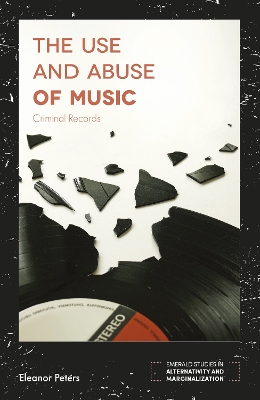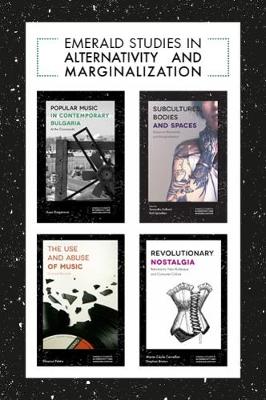Emerald Studies in Alternativity and Marginalization
2 total works
Music may not be an obvious area for a criminologist's attention, but there are many areas appropriate for analysis in the relationship between sound, music, rights and harm. The Use and Abuse of Music: Criminal Records explores how music is utilised to include, exclude, dominate and silence.
Analysing the connection between music and crime from an expressly critical criminological perspective, the book is divided into three main parts. Firstly, focusing on the concept of 'harmful' or deviant music, genres such as UK drill music and heavy metal are examined to highlight the connections between certain genres and criminalisation. Moving away from specifics of genre, the second section considers the use of music in war and conflict. Finally, the book reflects on the censorship and silencing of subcultures and individuals through music, highlighting the inequalities surrounding who is permitted to make noise which is often exemplified by racist, sexist and prejudicial actions.
This illuminating exploration of the deviant and transgressive nature of music is ideal for researchers, scholars and students working within the fields of criminology, sociology and musicology.
Analysing the connection between music and crime from an expressly critical criminological perspective, the book is divided into three main parts. Firstly, focusing on the concept of 'harmful' or deviant music, genres such as UK drill music and heavy metal are examined to highlight the connections between certain genres and criminalisation. Moving away from specifics of genre, the second section considers the use of music in war and conflict. Finally, the book reflects on the censorship and silencing of subcultures and individuals through music, highlighting the inequalities surrounding who is permitted to make noise which is often exemplified by racist, sexist and prejudicial actions.
This illuminating exploration of the deviant and transgressive nature of music is ideal for researchers, scholars and students working within the fields of criminology, sociology and musicology.
Emerald Studies in Alternativity and Marginalization Book Set (2017-2019)
by Amanda DiGioia, Karl Spracklen, Samantha Holland, Marie-Cecile Cervellon, Asya Draganova, and Eleanor Peters
Published 10 August 2020
Do we really understand what it means to be 'alternative'?
In contemporary society, alternative music scenes such as heavy metal, goth and punk have spread around the world; and alternative fashions and embodiment practices are now adopted by footballers and fashion models. Alternativity delineates those spaces, scenes, sub-cultures, objects and practices in modern society that are actively designed to be counter or resistive to mainstream popular culture.However, there is a lack of understanding of the challenges faced by those who embrace alternative lifestyles and what it means to be alternative in globalised society.
What 'alternative' looks like is explored in these titles, providing unique home for research that will expand our understanding of sub-cultures, scenes and practices defined as alternative.
Titles included in this set:
In contemporary society, alternative music scenes such as heavy metal, goth and punk have spread around the world; and alternative fashions and embodiment practices are now adopted by footballers and fashion models. Alternativity delineates those spaces, scenes, sub-cultures, objects and practices in modern society that are actively designed to be counter or resistive to mainstream popular culture.However, there is a lack of understanding of the challenges faced by those who embrace alternative lifestyles and what it means to be alternative in globalised society.
What 'alternative' looks like is explored in these titles, providing unique home for research that will expand our understanding of sub-cultures, scenes and practices defined as alternative.
Titles included in this set:
- Childbirth and Parenting in Horror Texts:The Marginalized and the Monstrous;
- The Evolution of Goth Culture:The Origins and Deeds of the New Goths;
- Popular Music in Contemporary Bulgaria:At the Crossroads;
- Revolutionary Nostalgia:Retromania, Neo-Burlesque, and Consumer Culture;
- Subcultures, Bodies and Spaces:Essays on Alternativity and Marginalization;
- The Use and Abuse of Music:Criminal Records;

